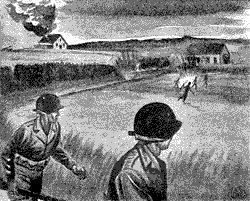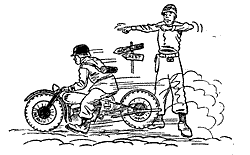|
|
|
|
VIII Montélimar and the Pursuit North |
|
| Then came Montélimar! A name that was to take its place, along with Salerno, the
Rapido, San Pietro and Cassino, a place where battle reached its highest crescendo and
waving flags, cheering crowds and corsages tied together with bits of red, white and blue
ribbon are forgotten. For us in the 2nd Battalion, Montélimar means a barren hill with German
tanks and infantry surrounding us for six unforgettable hours; thousands of rounds of our
own artillery thudding into the waves of Germans that were flung at our position from
every side; Mark V tanks so close that you could feel the heat from the motor; a
withdrawal at night from a hill covered with burning, exploding tanks, knocked out guns
and dead men. But the road to Deutschland was not open to the Germans yet. At La Coucourde, just north of Montélimar, the 1st Battalion had fought its way over Hill 300 and blocked the road with eight tank destroyers and three tanks. Desperately the enemy flung the full weight of his force against us. In the darkness we could hear the clank of slowly moving armor on the highway to the south. At one o'clock in the morning hell broke loose and only when six of our tank destroyers and all three of our tanks were in flames around us did we fall back before the frenzied onslaught of the skilled 111th Panzer Division, which was seeking to escape from the rapidly decreasing pocket in which it was caught.
Gradually as more of the Division was brought into the battle our scene shifted a little to the south and the 3rd Battalion spent a bloody and costly day attacking a cluster of heavily defended stone buildings, perched on top of a small hill in the rolling Rhone Valley like some medieval fortress, That was Montélimar! ... a great savage beast trapped and mortally wounded fought with a determination and fierceness that was new to those of us who had fought the elite of the German Army at Salerno, Mignano Gap, Cassino and Anzio. To the men that command our armies it was a daring blow, a gamble that turned an organized and formidable German Army into a broken, disorganized and terribly weakened mass of men and materiel fleeing to the north. To our officers it was a period of trying to do too much with too little, trying to see the broader aspect and believe that the heavy casualties suffered would save many lives later when this same German force could fight us under more advantageous conditions. To the dogface carrying a BAR or an M-1 it was a week when a man couldn't even afford the luxury of thinking about mail, which is the most important thing in a combat soldier's life, and only at rare moments did he dare let his thoughts go to that quiet life with the little wife and kids. It was the kind of a fight that makes the litter bearer and the aid man the doughboy's hero. It was the kind of a fight that leaves the men that are left in a company united by a close bond that you can never tell anyone about — the thing that keeps an outfit going day after day, week after week and month after month, attacking almost every day the way we were going to for the next three months.
|
|
Copyright © 1945, 1998 141st Infantry Regiment
Association. |


 We will never forget the eery sight of a TD
pulling a knocked out ton-and-a-half and a 57 mm. AT gun loaded down with 50 men swathed
in blood soaked bandages and a handful of Medicos with their white and red helmets
gleaming in the moonlight. We were all too dazed to think much; just surprised and
thankful that we were still alive and free; thanking God for having the kind of Medicos we
had; thanking God for the 131st Field Artillery which was throwing hundreds of rounds of
shells over our heads keeping the Krauts pinned down. For 24 hours we had held that hill
looking, down on Montélimar against a rising flood of German troops pushing north as the
3rd Division was reported only ten miles to the south. We knew that we had taken a
beating, but for every man we had lost on that hill, we knew the Krauts had paid ten times
as he assaulted across that open ground.
We will never forget the eery sight of a TD
pulling a knocked out ton-and-a-half and a 57 mm. AT gun loaded down with 50 men swathed
in blood soaked bandages and a handful of Medicos with their white and red helmets
gleaming in the moonlight. We were all too dazed to think much; just surprised and
thankful that we were still alive and free; thanking God for having the kind of Medicos we
had; thanking God for the 131st Field Artillery which was throwing hundreds of rounds of
shells over our heads keeping the Krauts pinned down. For 24 hours we had held that hill
looking, down on Montélimar against a rising flood of German troops pushing north as the
3rd Division was reported only ten miles to the south. We knew that we had taken a
beating, but for every man we had lost on that hill, we knew the Krauts had paid ten times
as he assaulted across that open ground. In the fighting around Montelimar operations were
often in a confused state. Near Crest a fleeing Jerry motorcyclist approached a crossroads
near the Division Command Post. Standing there was one of the faithful Division MP's
attempting to keep straight the mobile affairs of the 36th. Seeing the Jerry speeding
toward him in frantic flight, the MP, following the dictates of his habits, helpfully
waved him on.
In the fighting around Montelimar operations were
often in a confused state. Near Crest a fleeing Jerry motorcyclist approached a crossroads
near the Division Command Post. Standing there was one of the faithful Division MP's
attempting to keep straight the mobile affairs of the 36th. Seeing the Jerry speeding
toward him in frantic flight, the MP, following the dictates of his habits, helpfully
waved him on.